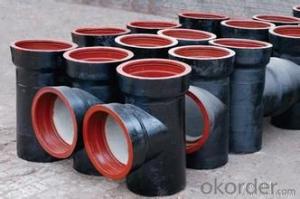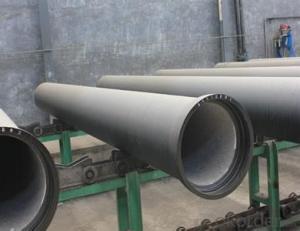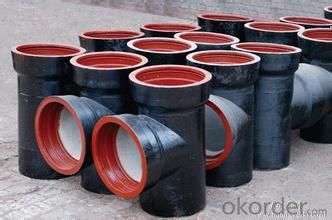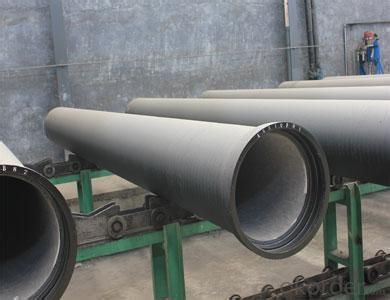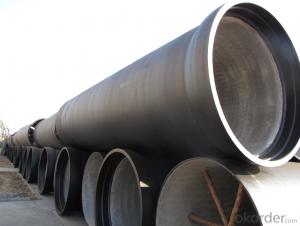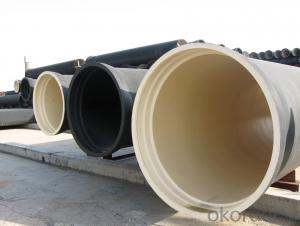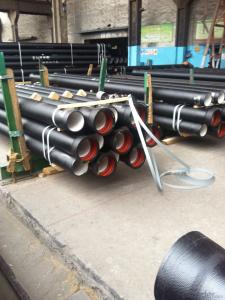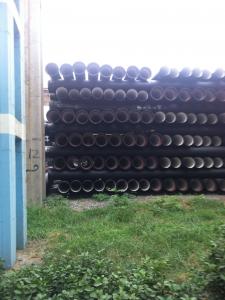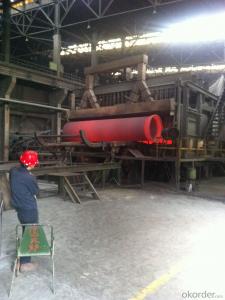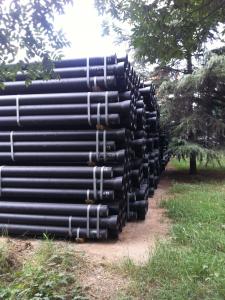DUCTILE IRON PIPE AND PIPE FITTINGS K7 CLASS DN250
- Loading Port:
- Tianjin
- Payment Terms:
- TT OR LC
- Min Order Qty:
- 23 pc
- Supply Capability:
- 3000 pc/month
OKorder Service Pledge
OKorder Financial Service
You Might Also Like
· Material : Ductile Cast Iron
· Size Range : DN 80mm to DN 2000mm
· Unit Effective Length : 6m or 5.7m
· Manufacture Standard: ISO 2531:1998/ EN 545:2006/EN 598:2007
· Annual capacity : 200,000 tons
· Coating Exterior: Zinc 130g/m2 according to ISO 8179-1 and bitumen coating 70 microns.
· Cement Interior: Portland Cement/ High Alumina Cement/ Sulphate Resisting Cement Lining according to ISO 4179
· Special requirements on external coating and internal lining can be applied
· We also provide accessories such as SBR/EPDM rubber gaskets, lubricant paste, pipe caps, PE sleeves, etc.
Additional Parts:
Each pipe is strictly inspected according to related standard to ensure permanently high performance.
Easy Installation at site and service free for life
Long Service Lifespan
Quotation will arrive you within 24hours once we get your inquiry.
We guarantee offering you a competitive price.
A copy of original inspection reports of pipes will be offered after shipment.
Photos of loading process will be sent to the customer after shipment effect.
We will follow-up the delivery progress after shipment effect and update to the customer on weekly basis.
- Q: Can ductile iron pipes be used for underground steam distribution systems?
- Yes, ductile iron pipes can be used for underground steam distribution systems. Ductile iron is a type of cast iron that has been treated with magnesium to make it more flexible and resistant to cracking. This makes it suitable for use in underground applications where the pipes may need to withstand high pressure and temperature conditions, such as in steam distribution systems. Ductile iron pipes have excellent strength and durability, which makes them capable of handling the extreme conditions associated with steam distribution. Additionally, their corrosion resistance properties make them a reliable choice for long-term use in underground environments. However, it is important to note that proper insulation should be used to prevent heat loss and ensure the efficiency of the steam distribution system.
- Q: What is the expected thermal expansion coefficient of ductile iron pipes?
- The thermal expansion coefficient of ductile iron pipes can vary due to several factors, such as the iron's specific composition and the temperature range of pipe usage. However, as a general rule, ductile iron pipes typically have a thermal expansion coefficient ranging from 10 to 14 x 10^-6 per degree Celsius (10-14 μm/m°C). This means that for every increase of one degree Celsius in temperature, the length of a ductile iron pipe will expand by approximately 10 to 14 micrometers per meter. It is important to acknowledge that these values are not exact and may differ depending on the specific circumstances and application of the pipes.
- Q: How are ductile iron pipes tested for quality?
- Various methods are employed to test the quality of ductile iron pipes, ensuring they meet required standards and specifications. One commonly used test is the hydrostatic pressure test, wherein the pipes are subjected to high-pressure water or other liquids to detect leaks or weaknesses. Water is typically used to fill the pipes, with the pressure gradually increased to a predetermined level. This test effectively identifies potential defects that could compromise the pipes' integrity. Another important quality test for ductile iron pipes is the tensile test. This involves pulling a sample of the pipe until it breaks, measuring the applied force and elongation. By doing so, the pipe's tensile strength and ductility can be determined, ensuring it can withstand required loads and stresses without deformation or failure. In addition to these tests, other quality checks include visual inspection, dimensional checks, and surface defect examinations. Visual inspection involves scrutinizing the pipes for visible defects like cracks, voids, or surface irregularities. Dimensional checks ensure the pipes meet specified dimensions and tolerances. Furthermore, ductile iron pipes often undergo corrosion resistance tests. This entails exposing the pipes to corrosive environments such as saltwater or acidic solutions to evaluate their resistance to corrosion. This is vital in determining the pipes' durability and longevity, particularly in harsh conditions. Overall, ductile iron pipes undergo rigorous testing to ensure their quality and performance. These tests guarantee that the pipes meet required standards, are safe for use, and can withstand anticipated loads and environmental conditions in their intended applications.
- Q: Are ductile iron pipes suitable for installation in areas with high traffic loads?
- Ductile iron pipes are indeed suitable for installation in areas characterized by heavy traffic loads. The reason behind this lies in the remarkable strength and durability of ductile iron, rendering it an optimal selection for situations involving substantial loads and consistent traffic. This material possesses outstanding resistance to impact and can endure heavy loads without succumbing to cracks or fractures. Furthermore, ductile iron pipes boast a notable capacity for bearing heavy loads, enabling them to effectively withstand the weight and pressure imposed by vehicles and other weighty machinery. Consequently, these pipes find widespread utilization in locations such as highways, roads, bridges, and other regions experiencing significant traffic volumes.
- Q: Comparison of ductile iron pipe and spiral steel pipe
- Ball milling cast iron pipe: corrosion resistance, high compressive strength, cheap, non pressure, socket connection.
- Q: Are ductile iron pipes resistant to abrasion or wear?
- Yes, ductile iron pipes are highly resistant to abrasion or wear. Ductile iron, also known as cast iron, is a strong and durable material that is specifically designed to withstand abrasive conditions. The unique microstructure of ductile iron provides excellent resistance to abrasion, making it an ideal choice for applications where pipelines are exposed to high levels of wear. Additionally, ductile iron pipes are known for their long service life, which further demonstrates their ability to withstand abrasion and wear over time.
- Q: Can ductile iron pipes be used for high-pressure applications?
- Yes, ductile iron pipes can be used for high-pressure applications. Ductile iron is a strong and durable material that can withstand high pressure and loads. It has excellent mechanical properties, including high tensile strength and impact resistance, making it suitable for various applications, including water and wastewater systems, oil and gas pipelines, and industrial processes. Additionally, ductile iron pipes have a high resistance to corrosion and abrasion, further enhancing their suitability for high-pressure environments. However, it is essential to consider the specific requirements and design factors of the application to ensure that the ductile iron pipes meet the necessary standards and specifications for the desired pressure range.
- Q: How much is the manual installation fee of ductile iron pipes from 100 to 150 per metre?
- According to the various connection modes after the installation of artificial fee at =8.7~9.0 yuan (about /M this is pure artificial installation fee, no other costs to calculate, if packet labor costs and construction should be appropriately increased when installed).
- Q: Are ductile iron pipes resistant to environmental stress cracking?
- Yes, ductile iron pipes are highly resistant to environmental stress cracking.
- Q: How are ductile iron pipes protected against stray current corrosion?
- Ductile iron pipes are protected against stray current corrosion through the implementation of various measures. One common method is the installation of a protective coating, such as an epoxy or zinc coating, on the external surface of the pipes. This coating acts as a barrier, preventing direct contact between the pipe and the surrounding soil or water. Additionally, cathodic protection systems, such as impressed current or sacrificial anode systems, can be employed to further protect the pipes. These systems help to control and redirect stray currents, minimizing their impact on the ductile iron pipes and preventing corrosion.
Send your message to us
DUCTILE IRON PIPE AND PIPE FITTINGS K7 CLASS DN250
- Loading Port:
- Tianjin
- Payment Terms:
- TT OR LC
- Min Order Qty:
- 23 pc
- Supply Capability:
- 3000 pc/month
OKorder Service Pledge
OKorder Financial Service
Similar products
Hot products
Hot Searches
Related keywords
